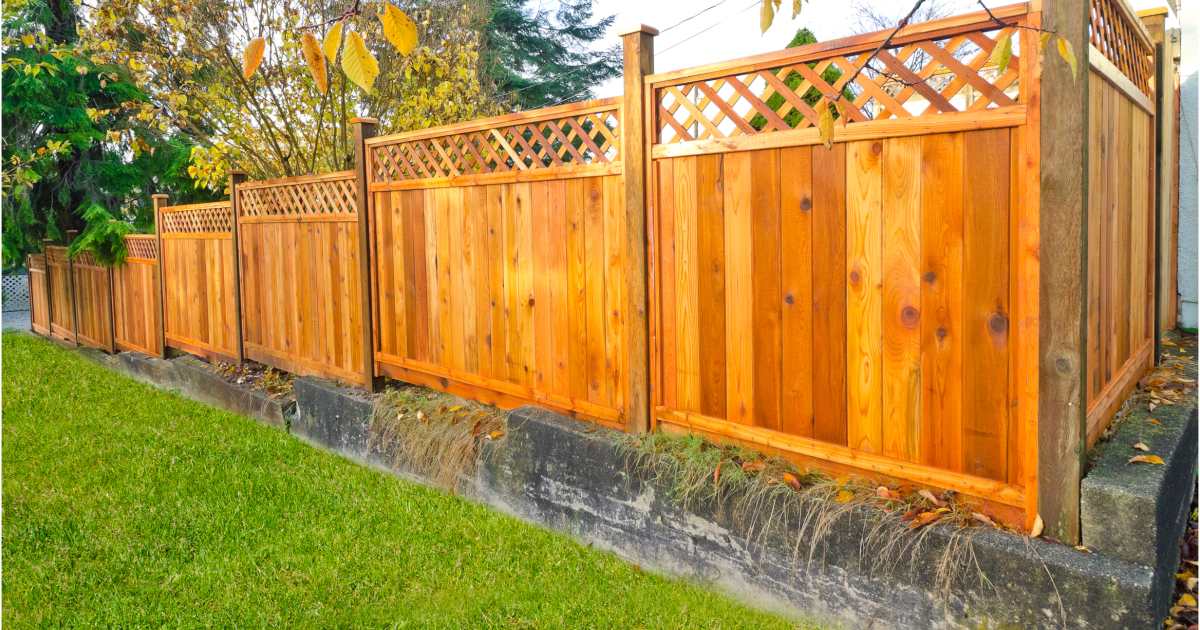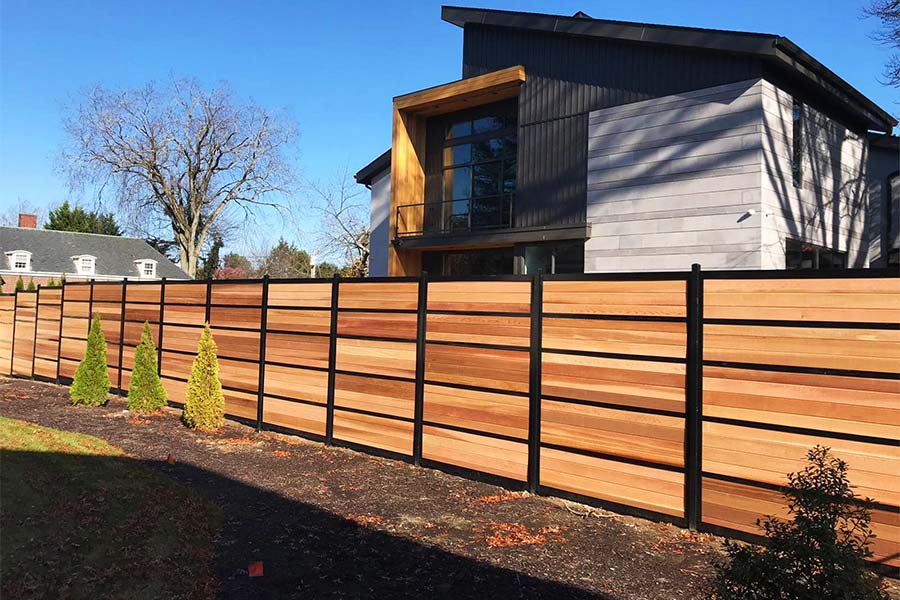All Categories
Featured
Choosing the ideal fencing product for your residential or commercial property can be a difficult task with the variety of alternatives readily available. Whether you're intending to boost safety and security, boost privacy, or enhance the aesthetic appeal of your home or business, the right fencing can serve numerous purposes. In this guide, we'll explore various fencing materials, their advantages, and which choices may be ideal suited for numerous demands.
Advantages:
Natural Feel And Look: Wood provides a cozy, natural visual that complements gardens, lawns, and other outdoor spaces. Adjustable: You can repaint or stain timber fence any kind of shade, enabling for endless design opportunities. Privacy and Safety and security: When created as a strong panel, a wood fence can offer outstanding personal privacy and safety. Disadvantages:
Upkeep Required: Wood fencings call for periodic maintenance to prevent rot, warping, and damages from parasites like termites. Vulnerable to Weather Condition: Direct exposure to snow, rain, and sunlight can weaken the top quality of the wood over time, which indicates you might need to reseal or change boards. Best For: Home owners looking for a traditional, personalized fencing with an all-natural look.
Benefits:
Long-Lasting and durable: Vinyl is immune to the weathering that timber fencings experience, and it won't warp, fracture, or fade. Low Upkeep: Unlike wood, plastic doesn't require staining or securing. Cleaning it is as straightforward as washing it with water. Selection of Styles: Vinyl fence is readily available in many designs and colors, and some variations even mimic the look of timber. Negative Aspects:
Higher Initial Cost: Plastic fences can be much more expensive to install contrasted to various other materials, such as timber or chain web link. Prone to Splitting: While durable, plastic can come to be weak and split in extremely cool temperature levels or when struck with force. Limited Modification: Unlike wood, plastic can't be easily changed, so your style alternatives are much more minimal. Best For: Home owners who prioritize reduced maintenance and long-lasting longevity, and who agree to purchase a greater initial cost.
Advantages:
Economical: One of the most budget-friendly secure fencing choices, making it ideal for large properties or areas calling for comprehensive protection. Low Upkeep: Wire mesh fence need little to no upkeep past occasional cleaning and fixings. Durable and Secure: While not visually appealing, chain web link fencings are strong, difficult to climb up, and supply a high degree of protection. Negative Aspects:
![]()
Lack of Privacy: A wire mesh fence does not use much privacy unless you include slats or other modifications. Industrial Look: The cord mesh might not enhance all residential property types, especially domestic homes or locations requiring an aesthetic touch. Best For: Huge residential or commercial properties or areas where budget is a top priority, or for those that require a strong, safe and secure boundary without the requirement for privacy.
Benefits:
Strong and Secure: Steel fencings provide outstanding protection, as they are hard to climb up and supply a robust barrier versus trespassers. Long Lifespan: Steel fences can last for decades, specifically when dealt with for corrosion and deterioration resistance. Elegant Visual: Wrought iron and steel fences add an elegant, timeless aim to homes, yards, or industrial residential properties. Downsides:
Costly: Steel fences, particularly wrought iron, tend to have a greater upfront cost than various other products. Upkeep Requirements: Steel and wrought iron fences may corrosion with time if not effectively kept, needing routine paint or therapy. Restricted Privacy: Metal fences are typically open, so they do not provide the privacy that solid fences like timber or vinyl can supply unless incorporated with various other materials. Best For: Those seeking a high-security, attractive option with a long life-span, especially for high-traffic or high end locations.
Benefits:
![]()
Reduced Upkeep: Compound fence needs no painting, discoloration, or sealing. It's simple to tidy with just soap and water. Sturdiness: Immune to rot, parasites, and weather, composite fences last longer than standard wood. Eco-Friendly: Numerous composite products are made from recycled timber and plastic, lowering environmental effect. Disadvantages:
Costly: The preliminary cost of composite secure fencing can be more than timber or vinyl. Limited Modification: While available in various colors, composite fences do not provide as numerous layout options as timber. Heavy: Composite products are often heavier than other sorts of fencing, which can make setup harder. Best For: Those who want a low-maintenance, environmentally friendly alternative that incorporates the appearance of timber with raised toughness.
Final thought. Picking the best fence material for your home depends on a range of elements, including your budget, visual preferences, privacy requirements, and maintenance determination. Whether you opt for the timeless appeal of wood, the low-maintenance advantages of plastic, the strength of metal, or the eco-friendly sturdiness of composite, selecting the best fence needs mindful factor to consider of your home's unique requirements. By understanding the benefits and restrictions of each product, you can make an enlightened choice that supplies long-lasting worth and fulfillment for your residential property.
- Wood Secure fencing. Wood fence is a timeless option for numerous home owners because of its all-natural appeal, adaptability, and ability to blend flawlessly with different architectural designs. Offered in a range of styles, consisting of cattle ranch, personal privacy, and picket rails, timber can be tailored with paint or stain to match your wanted visual.
Advantages:
Natural Feel And Look: Wood provides a cozy, natural visual that complements gardens, lawns, and other outdoor spaces. Adjustable: You can repaint or stain timber fence any kind of shade, enabling for endless design opportunities. Privacy and Safety and security: When created as a strong panel, a wood fence can offer outstanding personal privacy and safety. Disadvantages:
Upkeep Required: Wood fencings call for periodic maintenance to prevent rot, warping, and damages from parasites like termites. Vulnerable to Weather Condition: Direct exposure to snow, rain, and sunlight can weaken the top quality of the wood over time, which indicates you might need to reseal or change boards. Best For: Home owners looking for a traditional, personalized fencing with an all-natural look.
- Plastic (PVC) Fence. Vinyl fencings have grown in appeal because of their reduced maintenance and toughness. Made from synthetic plastic products, vinyl fences are resistant to rot, fading, and bugs, providing a clean, modern look with little upkeep.
Benefits:
Long-Lasting and durable: Vinyl is immune to the weathering that timber fencings experience, and it won't warp, fracture, or fade. Low Upkeep: Unlike wood, plastic doesn't require staining or securing. Cleaning it is as straightforward as washing it with water. Selection of Styles: Vinyl fence is readily available in many designs and colors, and some variations even mimic the look of timber. Negative Aspects:
Higher Initial Cost: Plastic fences can be much more expensive to install contrasted to various other materials, such as timber or chain web link. Prone to Splitting: While durable, plastic can come to be weak and split in extremely cool temperature levels or when struck with force. Limited Modification: Unlike wood, plastic can't be easily changed, so your style alternatives are much more minimal. Best For: Home owners who prioritize reduced maintenance and long-lasting longevity, and who agree to purchase a greater initial cost.
- Chain Link Secure Fencing. Chain web link fences are an affordable option for those looking for safety without the high cost tag. Normally made use of in commercial homes, parks, and big houses, wire mesh fence offer a reliable limit and are available in a selection of elevations.
Advantages:
Economical: One of the most budget-friendly secure fencing choices, making it ideal for large properties or areas calling for comprehensive protection. Low Upkeep: Wire mesh fence need little to no upkeep past occasional cleaning and fixings. Durable and Secure: While not visually appealing, chain web link fencings are strong, difficult to climb up, and supply a high degree of protection. Negative Aspects:

Lack of Privacy: A wire mesh fence does not use much privacy unless you include slats or other modifications. Industrial Look: The cord mesh might not enhance all residential property types, especially domestic homes or locations requiring an aesthetic touch. Best For: Huge residential or commercial properties or areas where budget is a top priority, or for those that require a strong, safe and secure boundary without the requirement for privacy.
- Steel Secure Fencing (Aluminum, Steel, Wrought Iron) Steel fences, such as aluminum, steel, and wrought iron, are preferred for their strength, durability, and safety and security. These products are typically used in high-security commercial residential properties, high end residential areas, and those looking for a sophisticated, attractive appearance.
Benefits:
Strong and Secure: Steel fencings provide outstanding protection, as they are hard to climb up and supply a robust barrier versus trespassers. Long Lifespan: Steel fences can last for decades, specifically when dealt with for corrosion and deterioration resistance. Elegant Visual: Wrought iron and steel fences add an elegant, timeless aim to homes, yards, or industrial residential properties. Downsides:
Costly: Steel fences, particularly wrought iron, tend to have a greater upfront cost than various other products. Upkeep Requirements: Steel and wrought iron fences may corrosion with time if not effectively kept, needing routine paint or therapy. Restricted Privacy: Metal fences are typically open, so they do not provide the privacy that solid fences like timber or vinyl can supply unless incorporated with various other materials. Best For: Those seeking a high-security, attractive option with a long life-span, especially for high-traffic or high end locations.
- Compound Secure fencing. Compound fencing combines timber fibers and plastic to develop a material that simulates the look of timber but is more resilient and simpler to preserve. It's an environment-friendly option made from recycled materials, making it both useful and lasting.
Benefits:

Reduced Upkeep: Compound fence needs no painting, discoloration, or sealing. It's simple to tidy with just soap and water. Sturdiness: Immune to rot, parasites, and weather, composite fences last longer than standard wood. Eco-Friendly: Numerous composite products are made from recycled timber and plastic, lowering environmental effect. Disadvantages:
Costly: The preliminary cost of composite secure fencing can be more than timber or vinyl. Limited Modification: While available in various colors, composite fences do not provide as numerous layout options as timber. Heavy: Composite products are often heavier than other sorts of fencing, which can make setup harder. Best For: Those who want a low-maintenance, environmentally friendly alternative that incorporates the appearance of timber with raised toughness.
Final thought. Picking the best fence material for your home depends on a range of elements, including your budget, visual preferences, privacy requirements, and maintenance determination. Whether you opt for the timeless appeal of wood, the low-maintenance advantages of plastic, the strength of metal, or the eco-friendly sturdiness of composite, selecting the best fence needs mindful factor to consider of your home's unique requirements. By understanding the benefits and restrictions of each product, you can make an enlightened choice that supplies long-lasting worth and fulfillment for your residential property.
Latest Posts
Dependable Industrial Roof Solutions by Weathercraft
Published May 26, 25
1 min read
Join Your Financial Partner at WyHy – Top Benefits for Your Future
Published May 20, 25
1 min read
Uncover Cut Costs on Car Maintenance with Montclare Auto Repair’s Limited-Time Deals
Published May 19, 25
1 min read
More
Latest Posts
Dependable Industrial Roof Solutions by Weathercraft
Published May 26, 25
1 min read
Join Your Financial Partner at WyHy – Top Benefits for Your Future
Published May 20, 25
1 min read
Uncover Cut Costs on Car Maintenance with Montclare Auto Repair’s Limited-Time Deals
Published May 19, 25
1 min read